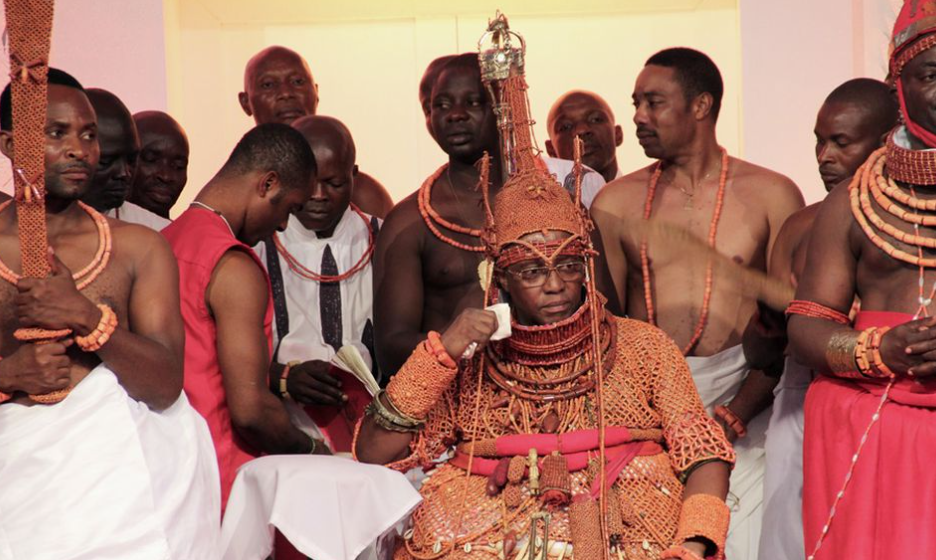
In the heart of Nigeria’s Edo State lies the ancient Benin Kingdom, a monarchy steeped in rich cultural heritage and traditions.
Among its most intriguing customs is the practice of the Oba (king) and his wives covering their mouths with white handkerchiefs during public ceremonies, a gesture that has captivated observers and sparked curiosity worldwide.
The Benin monarchy. a dynasty ruling the kingdom of Benin in modern-day Nigeria, begun its lineage in the 13th century. A prominent ruler, Oba Ewuare I (also known as Ewuare the Great), resigned from approximately 1440 to 1473. His reign is notable for the expansion of the kingdom both territorially and culturally, establishing traditions that are still observed today.)
The current Oba of Benin is Oba Ewuare II. He was born Eheneden Erediauwa on October 20, 1953. He ascended the throne as the 40th Oba of Benin on October 20, 2016, following the passing of his father, Oba Erediauwa. He was educated in Nigeria, the United Kingdom, and the United States. Oba Ewuare II holds degrees in economics and public administration, and before his coronation, he served as Nigeria’s ambassador to several countries, including Sweden, Angola, and Italy.)
The Oba’s Authority in Contemporary Nigeria
While the Oba’s role is largely ceremonial in modern Nigeria, his influence remains significant, especially within the Benin Kingdom. Traditional rulers like the Oba are recognised under Nigerian customary law, provided their practices align with principles of natural justice, equity, and good conscience.
The Oba often mediates disputes, particularly concerning land ownership, a critical issue in Edo State. His decisions, though not legally binding, carry substantial weight and are sometimes referenced in formal court proceedings.
Beyond legal matters, the Oba serves as a spiritual leader and custodian of Benin’s cultural heritage. His pronouncements are revered, and he is often seen as a peacemaker and moral compass for his people.
To many Bini people, the Oba holds a godlike status. When a reigning Oba passes, the kingdom observes a profound silence until the chiefs officially declare that “the chalk has broken”, a symbolic way of acknowledging his transition, as tradition holds that an Oba does not die.
Beyond his visible authority, the Oba’s influence is deeply spiritual. Many believe he possesses supernatural powers, and some fear that even a glance of disapproval from him can bring misfortune. While most residents of Benin City identify as Christians, many still uphold and revere the kingdom’s ancestral spiritual customs.
Why The Oba & His Wives Cover Their Mouths
The practice of the Oba and his wives covering their mouths is deeply rooted in Benin’s cultural and spiritual beliefs. Here are five reasons why:
- Symbol of Supreme Authority: The Oba’s words are considered final and sacrosanct. Covering his mouth signifies that he speaks sparingly, and when he does, his pronouncements are binding.
- Traditionally, the Oba does not eat in public, and his teeth should not be visible to the populace. This practice underscores his distinct status and the reverence accorded to him.
- Spiritual Protection: The Oba is believed to possess spiritual powers. Covering his mouth serves as a protective measure, ensuring that his potent words are not uttered casually, thereby preserving their sanctity.
- Wives’ Sign of Submission: The Oba’s wives also cover their mouths as a gesture of respect and submission, reflecting the hierarchical structure of the royal household and their acknowledgement of the Oba’s supreme position.
- By covering their mouths, the Oba and his wives maintain an aura of mystery and divinity, reinforcing the perception of the monarchy as a sacred institution.
In some cases, certain spokespersons speak on the Oba’s behalf, and their words carry the weight of law, taking immediate effect. This centuries-old tradition symbolises spiritual connection, ancestral respect, protection, wisdom, and royal protocol, reflecting the rich cultural heritage of the Benin Kingdom.
These traditions serve as a bridge connecting the present to a storied past, ensuring that the cultural identity and values of the Edo people are preserved for future generations.


![]()




